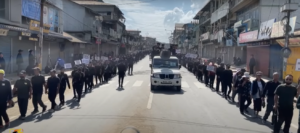Unau is your digital destination for celebrating the essence of brotherhood across the Kuki, Mizo, Zomi, and Hmar tribes.
As Manipur continues to be a boiling pot of ethno-political tensions, the Meitei Leepun, a radical group, has taken a hard stance against two vocal advocates—former additional SP Thounaojam Brinda and human rights activist Babloo Loitongbam— who have been articulating their neutral perspectives on the ongoing ethnic discord between Meitei and the Kuki-Zomi-Hmar-Mizo communities. This recent development further enunciates the deep-rooted issues entangling the state.
On October 5, 2023, Meitei Leepun Chief Lanjinghangjaba Heishnam Shilon held a press conference at the Manipur Press Club, wherein he confirmed a boycott against Brinda and Babloo, banning them from making public speeches until the pressing issues in Manipur find a resolution. The Meitei Leepun has made it clear that any violation of this prohibition will invite consequences deemed fit by the group.
The Meitei Leepun’s stand is not associated with any political affiliations as per Shilon, who expressed the group’s willingness to support any political factions that aim at the developmental upliftment of Manipur. Shilon didn’t hold back accusations against the Kuki-Zomi-Hmar-Mizo communities, labeling them as narcoterrorists and illegal immigrants, and blaming them for orchestrating the conflict that has been tearing through the communal harmony of the region.

The tumultuous situation exacerbated when a video featuring Thounaojam Brinda went viral. In the video, Brinda, a JD (U) candidate for the Yaskul A/C, placed the blame for the ethnic conflict squarely on the shoulders of the Meitei Leepun and Arambai Tanggol. This accusation triggered a swift retaliation from the radical factions. A mob, allegedly associated with these groups, confronted Brinda at her residence, pressuring her to publicly retract her statements and to apologize for the allegations.
In a parallel vein, Babloo Loitongbam, a lawyer and Director of Human Rights Alert in Manipur, too found himself at the receiving end of Meitei Leepun’s wrath. His condemnation of the radical groups and critique of Chief Minister Biren Singh’s inability to quell the five-month-long ethnic unrest didn’t sit well with the radicals. Following his outspoken stance, a group alleged to be members of the Meitei Leepun and Arambai Tenggol vandalized Babloo’s residence, causing significant property damage, and further, sending shockwaves through the community regarding the escalating volatility of the situation.
During the month of September, news broke out about the dissolution of Arambai Tenggol; however, recent activities near Kangla Fort in Imphal have contradicted these reports. The group was seen regrouping and pledging to protect Manipur’s land. The public sentiment has been largely against Pramod Singh, the leader of Meitei Leepun and Arambai Tenggol, holding him as a primary instigator of the ethnic discord, an accusation both groups have dismissed.
The ethno-political turmoil in Manipur is a deep-seated issue, with a myriad of factors contributing to the communal fissures. The recent actions of the Meitei Leepun underline the complex and hostile environment within which individuals and communities are operating. The silencing of Thounaojam Brinda and Babloo Loitongbam, who sought to bring a balanced perspective to the crisis, elucidates the challenges faced by those who attempt to mediate or voice opposing viewpoints in the face of entrenched radical ideologies. It’s a clarion call for stakeholders to tread with a blend of tact, insight, and resolve to navigate through this socio-political maze towards a sustainable peace.







